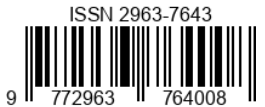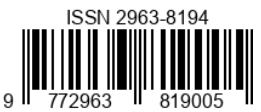Strategi Kelayakan Pendirian Usaha Eco Briket yang Memanfaatkan Limbah Ampas Kopi
DOI:
https://doi.org/10.55606/jekombis.v3i4.4245Keywords:
Business Strategy, Briquettes, Coffee GroundsAbstract
Eco Briquette is a business engaged in the trade sector that sells charcoal briquettes from coffee grounds waste, which is planned to be marketed to restaurants and MSMEs that use charcoal as a cooking medium for their products. Eco Briquette seeks to introduce this coffee charcoal briquette to be used in restaurants, MSMEs and even supermarkets in Semarang Regency and its surroundings. This is not done without reason, considering the advantages of this coffee grounds charcoal briquette are very many compared to the use of ordinary charcoal. The advantage of using Eco Briquette is its usability and uses coffee grounds waste materials that are rarely used in other briquettes. Unlike wood charcoal or other fuels that are easily used up or burn quickly, coffee grounds charcoal briquettes have a long useful life because they do not run out quickly when burned. In the process of burning charcoal briquettes, there is no flying powder and also the smoke produced by charcoal briquettes is not as much as ordinary charcoal, this can also reduce smoke pollution in Semarang Regency, especially in the Ungaran industrial area. The use of coffee grounds charcoal briquettes is also considered safer than regular charcoal, because it has a slow burning rate.
Downloads
References
Ardiansyah, H. N., & Fatihah, D. I. (2023). ANALISIS KELAYAKAN ASPEK KEUANGAN RENCANA PENGEMBANGAN USAHA PEMBUATAN BRIKET SEKAM PADI (Studi Kasus Pada UMKM Desa Waringinkarya Kab Karawang). Jurnal EK&BI, 6(2), 2620–7443. https://doi.org/10.37600/ekbi.v6i2.1097
Arsyam, M., & M. Yusuf Tahir. (2021). Ragam Jenis Penelitian dan Perspektif. Al-Ubudiyah: Jurnal Pendidikan Dan Studi Islam, 2(1), 37–47. https://doi.org/10.55623/au.v2i1.17
Bangsa, J. R., Isnawati, S. I., Fauzi, I., Aziz, A., & Siswati, A. (2023). Implications of the Influence of Digital Marketing in Increasing MSME Product Sales. 4(1), 34–42.
Bismala, L., & Handayani, S. (2019). Model Manajemen UMKM Berbasis Analisis SWOT. In Prosiding Seminar Nasional PB31 ITM, 437–446.
Fitriana, W., & Febrina, D. W. (2021). Analisis Potensi Briket Bio-Arang Sebagai Sumber Energi Terbarukan Analysis of Potency of Biocharcoal Briquettes As a Renewable Energy Source. Jurnal Teknik Pertanian Lampung, 10(2), 147–154. http://dx.doi.org/10.23960/jtep-l.v10.i2.147-154
Isnawati, S. I., & Bangsa, J. R. (2022). Creating Affirmative Action Through Endorsers in Business Communication. The Virtual International Conference …, 1, 1–6. https://callforpaper.unw.ac.id/index.php/ICOELH/article/view/132%0Ahttps://callforpaper.unw.ac.id/index.php/ICOELH/article/download/132/100
Leksono Edy, D., Widiyanti, & Komara Mindarta, E. (2019). Peningkatan Produktivitas Petani Tanaman Kopi Pemanfaatan Teknologi Mesin Pengering Kopi Bahan Bakar Briket Sebagai Bahan Bakar Alternatif. Sarwahita, 16(02), 175–182. https://doi.org/10.21009/sarwahita.162.09
Sugiyono. (2019). Metode Penelitian Kuantitatif, Kualitatif, dan R&D. Alfabeta.
Downloads
Published
How to Cite
Issue
Section
License
Copyright (c) 2024 Jurnal Penelitian Ekonomi Manajemen dan Bisnis

This work is licensed under a Creative Commons Attribution-ShareAlike 4.0 International License.







